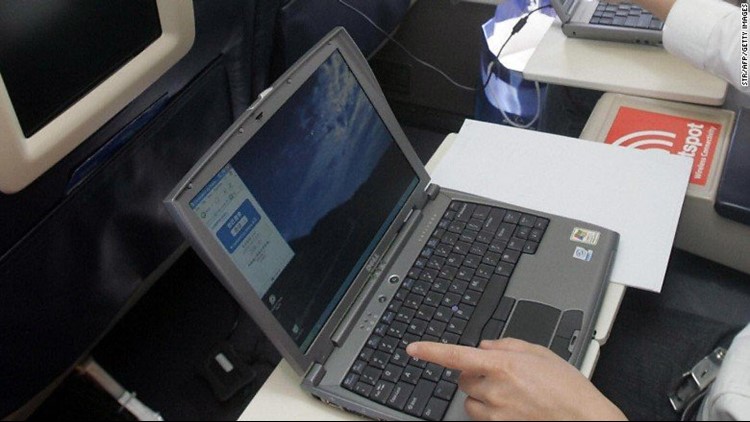The Department of Homeland Security is targeting and isolating certain aircraft for additional screening upon landing in the United States as part of the larger electronics ban the agency announced late last month.
The additional security procedure is happening behind the scenes and was not publicly disclosed by DHS when it announced a ban on electronic devices in the cabin of certain flights.
A source with knowledge of the screening procedures tells CNN that TSA is targeting flights arriving from the same Middle Eastern and North African countries covered in the electronics ban, and screening them with bombs sniffing dogs and equipment.
In some cases, it occurs before the plane even pulls up to the gate. The focus of the additional measure is the checked luggage in the cargo hold of the plane.
Before the new security posture was in place, passengers could retrieve their luggage immediately after deplaning. If they were at their final destination, they would leave the airport with luggage in hand. If they were on a connecting flight they would go through customs and their luggage would be re-screened before getting on their connecting flight. With the new procedures in place, all luggage is being screened before the passenger is reunited with their luggage.
“How and where those procedures are conducted varies according to the airport’s capabilities,” DHS spokesman David Lapan told CNN.
The enhanced screening is happening at 14 US airports. The Department of Homeland Security confirms the domestic US airports affected include: Atlanta (ATL), Boston (BOS), Chicago O’Hare (ORD), Dallas-Ft. Worth (DFW), Ft. Lauderdale (FLL), Houston Intercontinental (IAH), Los Angeles (LAX), Miami (MIA), Orlando (MCO), New York Kennedy (JFK), Philadelphia (PHL), San Francisco (SFO), Seattle-Tacoma (SEA) and Washington Dulles (IAD).
The flights being targeted for additional screening are any flights that originate from the 10 airports located in the 8 Muslim-majority countries impacted by the US electronics ban — Egypt, Jordan, Kuwait, Morocco, Qatar, Turkey, Saudi Arabia and the United Arab Emirates.
“These restrictions are not a reflection of confidence — or lack of confidence — in the airlines and airports involved, but a reaction to the threat environment and our assessment of risks,” Lapan said.
Lapan told reporters Tuesday it is too soon to tell if any of the airports currently on the list would be able to get off the list by improving their security posture. Lapan said the policy will be reviewed constantly because it is based on the threat environment.
“So, as we continue to evaluate the threat environment around air travel we may make other decisions to expand or to pull things back.” Lapan said. “But there is nothing we can say to a particular airport, ‘Here are the things you need to do to get off the list.’ We’re not there.”
The source with knowledge of TSA procedures told CNN that TSA doesn’t want the bags leaving the cargo hold without a second look.
“TSA is not on the ground to screen bags at those (Middle Eastern and North African) airports,” the source pointed out. “If a passenger is getting on a connecting flight in the domestic system or coming into an airport with luggage, TSA wants assurance those bags are safe.”
Lapan told reporters the electronics ban on certain electronic devices on board direct flights to the US from 10 specific African and Middle Eastern airports – could “possibly” expand. The expansion could include more airports or devices. However, he cautioned, no such measures are imminent.



